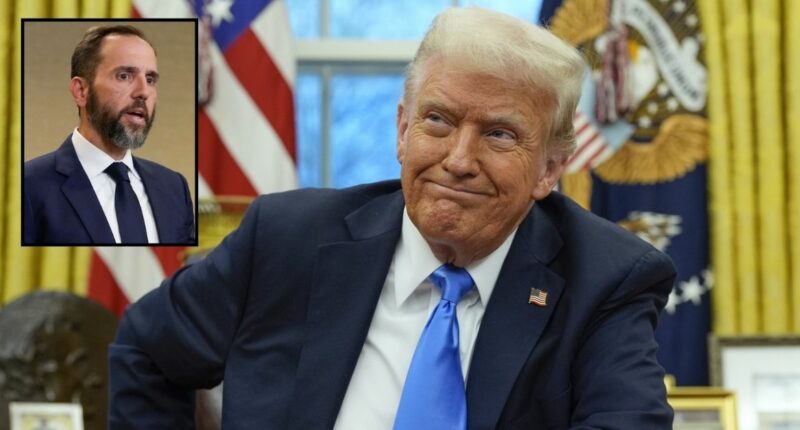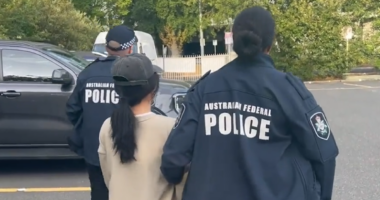Share this @internewscast.com
Inset: Jack Smith discusses the indictment of former President Donald Trump on Aug. 1, 2023, at a Department of Justice office in Washington (AP Photo/Jacquelyn Martin, File). Background: President Donald Trump talks to reporters in the Oval Office at the White House on Tuesday, Feb. 11, 2025, in Washington, D.C. (Photo/Alex Brandon).
President Donald Trump has expressed strong feelings about Jack Smith, the prosecutor handling his case, labeling him with terms like “scoundrel,” “dishonest,” “mean,” “deranged,” and a “left-wing radical.” Trump has even juxtaposed Smith’s name with his calls for the incarceration of political opponents.
Recently, speculation emerged about whether Smith might receive a preemptive pardon from then-President Joe Biden as a precaution against possible Trump-driven political retaliation. Now, Trump seems to be moving forward with retribution through an ethics complaint, leveraging a federal law that his first administration openly ignored: the Hatch Act.
Senator Tom Cotton, R-Ark., recently sent a letter to Jamieson Greer, a Trump operative serving as acting special counsel at the Office of Special Counsel (OSC)—distinct from the Special Counsel’s Office Smith previously led under U.S. Attorney General Merrick Garland’s direction—urging an inquiry into Smith for breaking 5 U.S. Code § 7323, a Hatch Act provision.
Reports say that the OSC has now opened investigation in response.
Various reports of potential and actual Hatch Act breaches from Trump’s initial term—like those involving “repeat offender” Kellyanne Conway, whom Trump declined to dismiss—as well as during Biden’s term generally highlight how the law “restricts certain political actions by federal employees,” such as promoting a political candidate while on duty, aiming to “ensure nonpartisan federal program administration, shield federal employees from workplace political pressure, and guarantee merit-based advancements over political allegiance.”
The law implicated by Cotton towards Smith dictates that a federal employee shall not “use their official power to influence or alter an election outcome” and “[n]o employee within the Criminal or National Security Divisions of the Department of Justice (unless appointed by the President and confirmed by the Senate) shall engage significantly in political management or campaigns.”
In his letter, Cotton said that an investigation was needed to determine if Smith “unlawfully took political actions to influence the 2024 election to harm then-candidate President Donald Trump,” claiming that “many” of the then-special counsel’s “legal actions seem to have no rationale” beyond naked politics.
Cotton then provided four examples that he said supported that conclusion: Smith tried to prosecute Trump before the 2024 election and that was too quick, since the federal Mar-a-Lago and Jan. 6 indictments did not come down until the summer of 2023; Smith sought certiorari before judgment at the Supreme Court on Trump’s immunity claims in a failed bid to fast-track the Jan. 6 case; after SCOTUS ruled that Trump’s — and any president’s — official acts are entitled to presumptive immunity, Smith was undeterred by campaign season and followed SCOTUS’ order to purge his allegations of official acts evidence by filing an immunity brief; and, according to Cotton, that filing was much too long, even though a judge allowed the “oversized” brief and was unconcerned with the nearness of the election.
In addition, Cotton complained that Smith’s timeline, capped off by the immunity brief, “appears to violate the Justice Department’s” unwritten “60-day rule, which prohibits timing any action, for the purpose of affecting any election or giving advantage or disadvantage to a candidate, within 60 days of the election.”
That is a rehashing of an argument Trump’s lawyers made, without success, in court and in the view of former federal prosecutors, given how the “60-day rule” — a “not binding or legally enforceable” voluntary DOJ guideline — is applied.
Taken together, Cotton’s complaint is that Trump was aggressively prosecuted up to, through, and without regard for the 2024 election, a fact that he insisted can only be explained by Smith’s political motivations.
“These actions were not standard, necessary, or justified-unless Smith’s real purpose was to influence the election,” the letter concluded. “In fact, throughout Special Counsel Smith’s tenure, he regularly used farfetched and aggressive legal theories to prosecute the Republican nominee for president.”
What will the investigation lead to for Smith if it goes as Cotton hopes?
Though there are criminal provisions in the Hatch Act which Cotton’s letter did not cite, OSC notes that civil violations of the Hatch Act can result in “removal from federal service, reduction in grade, debarment from federal service for a period not to exceed 5 years, suspension, letter of reprimand, or a civil penalty not to exceed $1,000.”
















